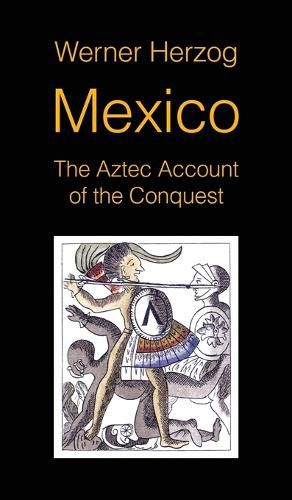Readings Newsletter
Become a Readings Member to make your shopping experience even easier.
Sign in or sign up for free!
You’re not far away from qualifying for FREE standard shipping within Australia
You’ve qualified for FREE standard shipping within Australia
The cart is loading…






This title is printed to order. This book may have been self-published. If so, we cannot guarantee the quality of the content. In the main most books will have gone through the editing process however some may not. We therefore suggest that you be aware of this before ordering this book. If in doubt check either the author or publisher’s details as we are unable to accept any returns unless they are faulty. Please contact us if you have any questions.
Written more than thirty years ago, Werner Herzog's Mexico screenplay - an epic, stylized dramatisation of the conquest of the Aztec empire by Hernan Cortes and his army in 1521 - is destined to remain unfilmed. But now it can be read.
An essential companion piece to the filmmaker's earlier, celebrated South American adventures, Aguirre, the Wrath of God (1972) and Fitzcarraldo (1982), Mexico pits Cortes, "a genius of deception and intrigue," against the emperor Motecuhzoma, "reserved, laconic, wavering between exaltation and despair." It takes readers from sandy shorelines to snow-capped mountains and the Aztec capital, Tenochtitlan, a "mighty metropolis" of canals, gardens and temples. Tense encounters between the Aztecs and the Spaniards build to a battle sequence of dazzlingly sustained intensity and invention.
As Herzog acknowledges, when he wrote Mexico in the early 1990s, its production costs "would have been prohibitively high. Today, even though many of the locations and battle scenes could be done digitally, it would still require the budget of a huge Hollywood movie. This kind of budget I could raise only if my last film grossed a few hundred million dollars at the US box office. Such is the Iron Law of the industry. But none of my films has grossed that much, and I felt that this screenplay has literary merit in its own right. I always wanted to develop screenplays as an independent form of literature. One normally would not publish a document like this before it is made into a film, but in this case the Iron Law still stands in my way."
$9.00 standard shipping within Australia
FREE standard shipping within Australia for orders over $100.00
Express & International shipping calculated at checkout
This title is printed to order. This book may have been self-published. If so, we cannot guarantee the quality of the content. In the main most books will have gone through the editing process however some may not. We therefore suggest that you be aware of this before ordering this book. If in doubt check either the author or publisher’s details as we are unable to accept any returns unless they are faulty. Please contact us if you have any questions.
Written more than thirty years ago, Werner Herzog's Mexico screenplay - an epic, stylized dramatisation of the conquest of the Aztec empire by Hernan Cortes and his army in 1521 - is destined to remain unfilmed. But now it can be read.
An essential companion piece to the filmmaker's earlier, celebrated South American adventures, Aguirre, the Wrath of God (1972) and Fitzcarraldo (1982), Mexico pits Cortes, "a genius of deception and intrigue," against the emperor Motecuhzoma, "reserved, laconic, wavering between exaltation and despair." It takes readers from sandy shorelines to snow-capped mountains and the Aztec capital, Tenochtitlan, a "mighty metropolis" of canals, gardens and temples. Tense encounters between the Aztecs and the Spaniards build to a battle sequence of dazzlingly sustained intensity and invention.
As Herzog acknowledges, when he wrote Mexico in the early 1990s, its production costs "would have been prohibitively high. Today, even though many of the locations and battle scenes could be done digitally, it would still require the budget of a huge Hollywood movie. This kind of budget I could raise only if my last film grossed a few hundred million dollars at the US box office. Such is the Iron Law of the industry. But none of my films has grossed that much, and I felt that this screenplay has literary merit in its own right. I always wanted to develop screenplays as an independent form of literature. One normally would not publish a document like this before it is made into a film, but in this case the Iron Law still stands in my way."